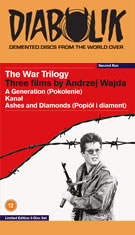
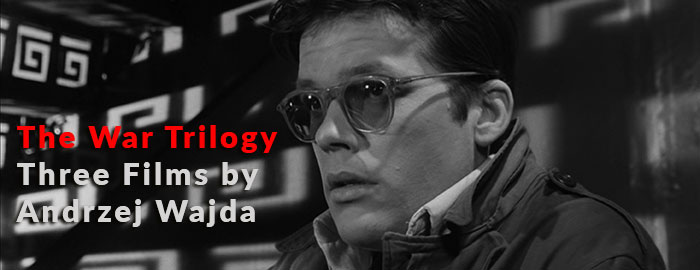
A GENERATION
B&W, 1955, 88 mins. 14 secs.
Directed by Andrzej Wajda
Starring Tadeusz Lomnicki, Urszula Modrzynska, Tadeusz Janczar
Second Run (Blu-ray) (UK R0 HD), Arrow Video (DVD (UK R0 PAL), Criterion (DVD) (US R1 NTSC), Umbrella (DVD) (Australia R4 PAL), Polish Art Center (DVD) (Poland R0 PAL)
KANAL
B&W, 1957, 96 mins. 45 secs.
Directed by Andrzej Wajda
Starring Teresa Iżewska, Tadeusz Janczar, Wieńczysław Gliński, Tadeusz Gwiazdowski
Second Run (Blu-ray) (UK R0 HD), Arrow Video (DVD (UK R0 PAL), Criterion (DVD) (US R1 NTSC), Umbrella (DVD) (Australia R4 PAL), Polish Art Center (DVD) (Poland R0 PAL)
ASHES AND DIAMONDS
B&W, 1958, 103 mins. 8 secs.
Directed by Andrzej Wajda
Starring
Zbigniew Cybulski, Ewa Krzyżewska, Wacław Zastrzeżyński, Adam Pawlikowski, Bogumił Kobiela
Second Run (Blu-ray) (UK R0 HD), Arrow Video (DVD (UK R0 PAL), Criterion (Blu-ray & DVD) (US RA/R1 HD/NTSC), Umbrella (DVD) (Australia R4 PAL), Polish Art Center (DVD) (Poland R0 PAL) / WS (1.66:1) (16:9), Facets (DVD) (US R1 NTSC)
Casting a longer shadow 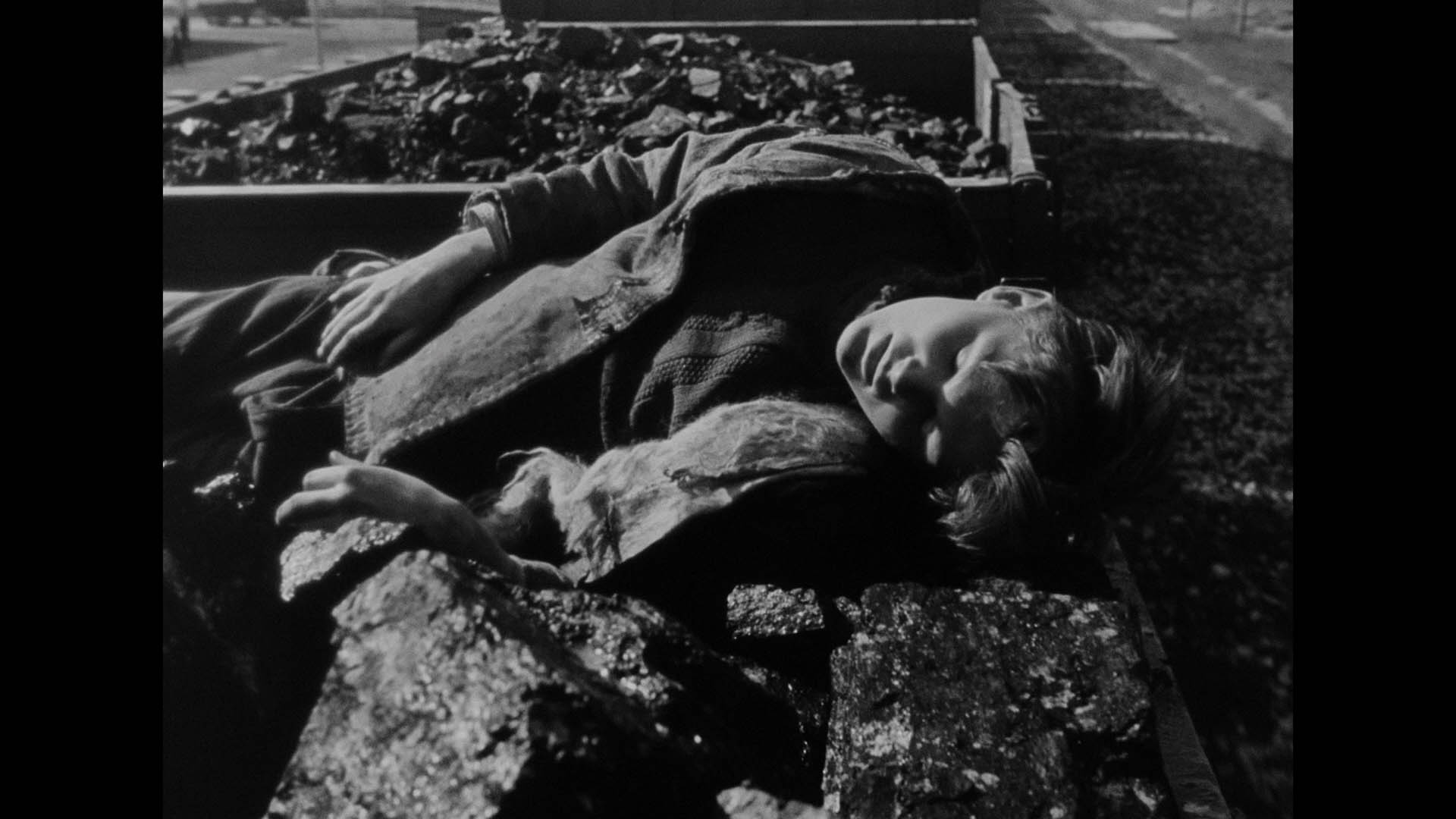 in the history of Polish cinema than any other filmmaker, Andrzej Wajda came storming out of the gate
in the history of Polish cinema than any other filmmaker, Andrzej Wajda came storming out of the gate 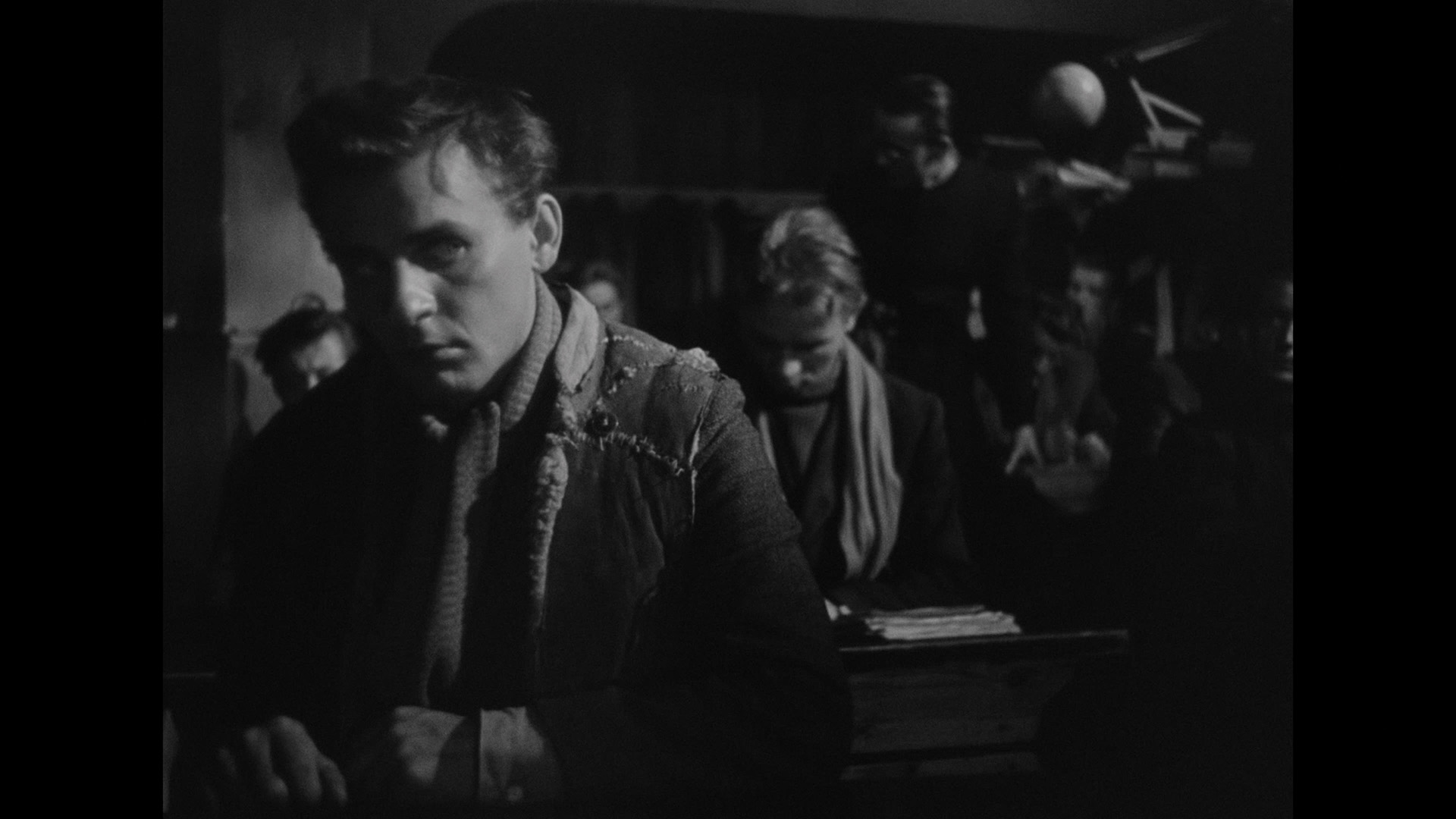 just under a decade after the end of World War II with a trilogy of films revolving around different aspects of the conflict. With each of the three films generating more acclaim than the last, they cemented a career that would be followed by such significant world cinema entries as Man of Iron, the Oscar-winning The Promised Land, Man of Marble, and Danton. The initial trilogy has been a home video mainstay for years, with the most heralded title getting multiple Blu-ray releases, but the U.K. Blu-ray set from late 2023 from Second Run offers the richest rewards with all three titles in immaculate restorations with a welcome batch of substantial extras.
just under a decade after the end of World War II with a trilogy of films revolving around different aspects of the conflict. With each of the three films generating more acclaim than the last, they cemented a career that would be followed by such significant world cinema entries as Man of Iron, the Oscar-winning The Promised Land, Man of Marble, and Danton. The initial trilogy has been a home video mainstay for years, with the most heralded title getting multiple Blu-ray releases, but the U.K. Blu-ray set from late 2023 from Second Run offers the richest rewards with all three titles in immaculate restorations with a welcome batch of substantial extras.
First up is 1955's A Generation (Pokolenie), Wajda's debut film as well as the first effort for many of its participants behind and in front of the camera (including lots of film school comrades and a few soon-to-be-famous names peppered throughout the credits). On the cusp of adulthood, Stach (Blind Chance's Lomnicki) lives in a destitute neighborhood of Nazi-occupied Warsaw where he engages in petty theft and other wayward behavior with others his age. He soon becomes enmeshed with the local underground communist 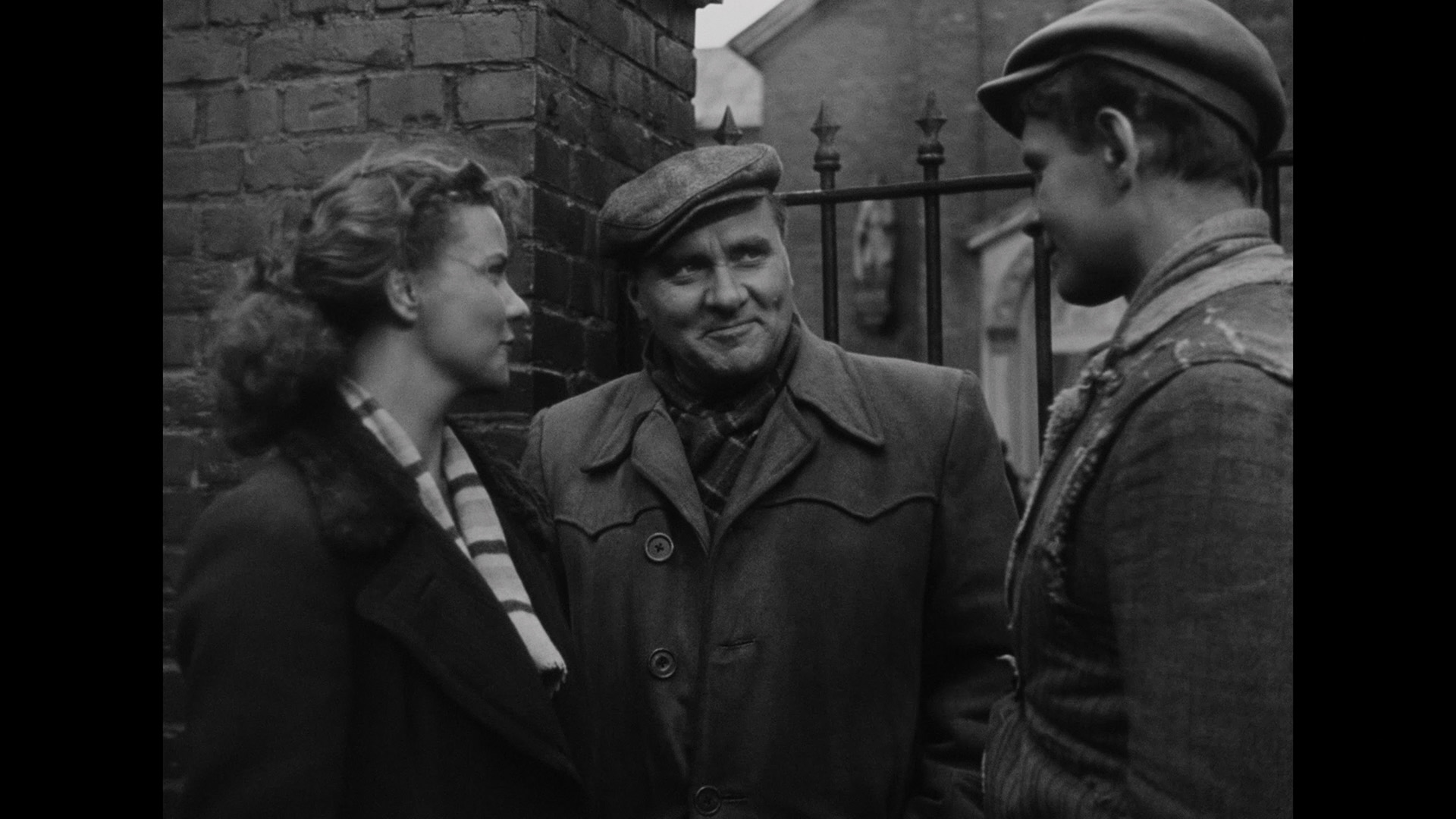 resistance through his new day job at a furniture store, and In the process he also finds a potential romance with Dorota (Modrzynska). With its naturalistic depictions of war-torn Polish ghettos and frequent discussions of Marxism and the nature of revolt, the film was enough to serve
resistance through his new day job at a furniture store, and In the process he also finds a potential romance with Dorota (Modrzynska). With its naturalistic depictions of war-torn Polish ghettos and frequent discussions of Marxism and the nature of revolt, the film was enough to serve 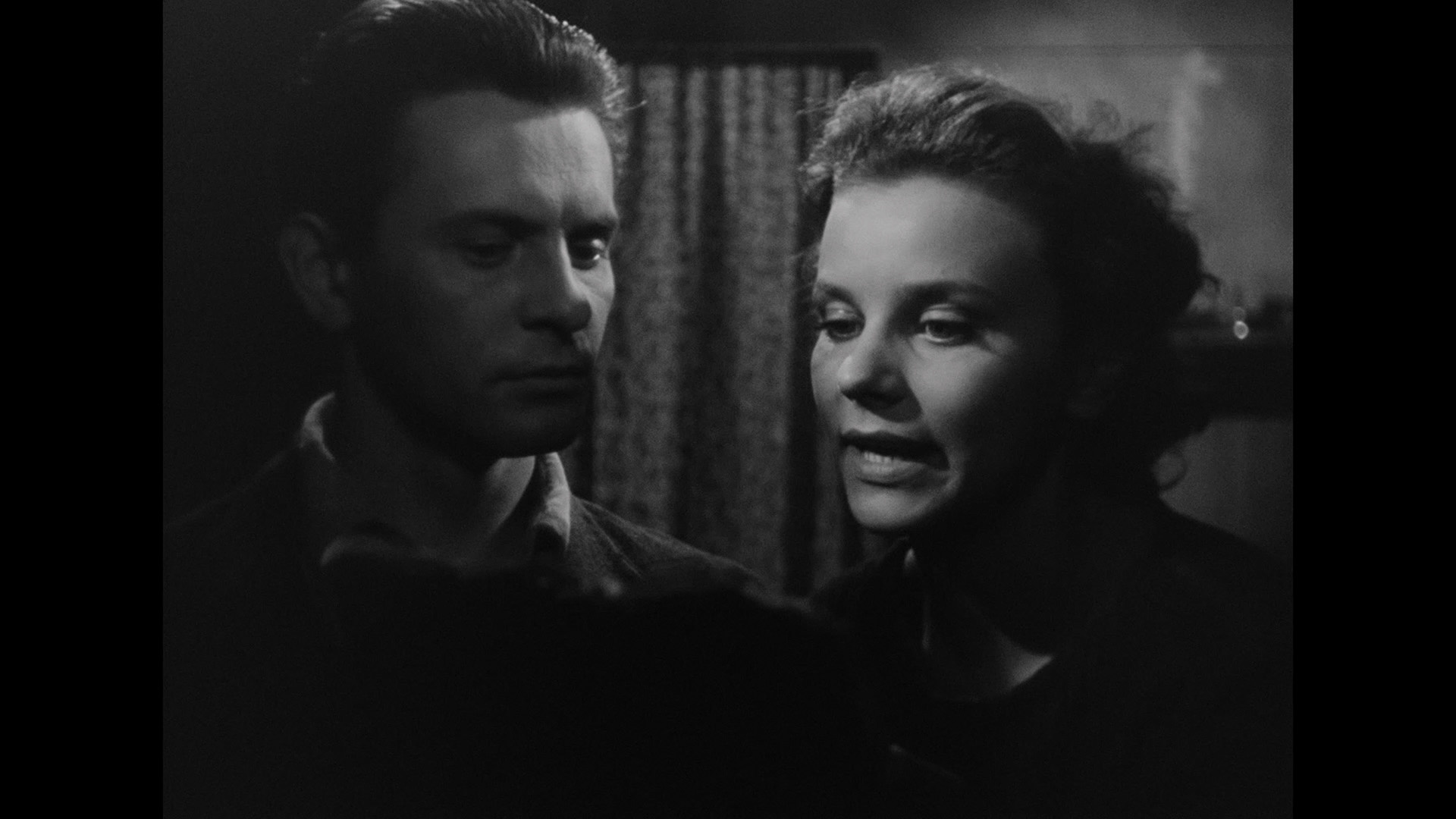 as a calling card for everyone involved. Despite Wajda's own subsequent minor misgivings about the film, it's a striking introduction with an often gripping sense of realism as the actors do their own stunt work, even hurtling on and off trains and firing loaded machine guns.
as a calling card for everyone involved. Despite Wajda's own subsequent minor misgivings about the film, it's a striking introduction with an often gripping sense of realism as the actors do their own stunt work, even hurtling on and off trains and firing loaded machine guns.
The governmental restrictions that made artistic expression a challenge in Poland had relaxed considerably by the time Wadja's second film was realized: 1957's Kanal, a Special Jury Prize winner at Cannes and a harrowing depiction of the Warsaw Uprising of 1944 that ultimately cost the lives of hundreds of thousands. In fact, it's a grim proclamation at the beginning of the film that death is likely awaiting our protagonists, a group of Home Army members whose friends and loved ones are already falling prey to the aggression of Nazi forces moving through Warsaw. Their only method of escape is through the sewers, an arduous process that occupies the bulk of the running time. Extremely intense and stunningly photographed, 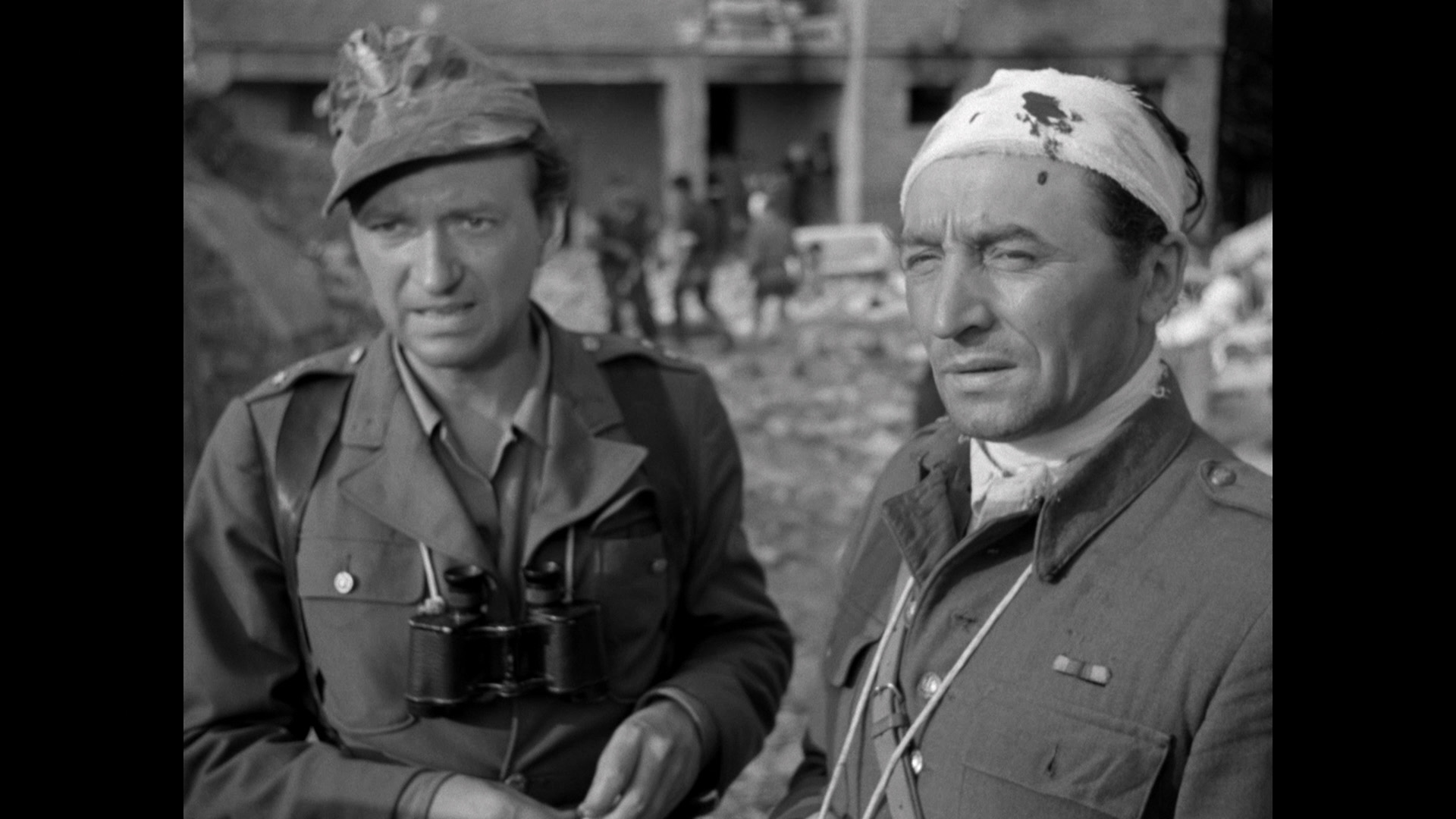 this is basically a survival story pared down to its brutal essentials with screenwriter Jerzy Stefan Stawiński using his own experience during the Warsaw Uprising in the sewers to
this is basically a survival story pared down to its brutal essentials with screenwriter Jerzy Stefan Stawiński using his own experience during the Warsaw Uprising in the sewers to 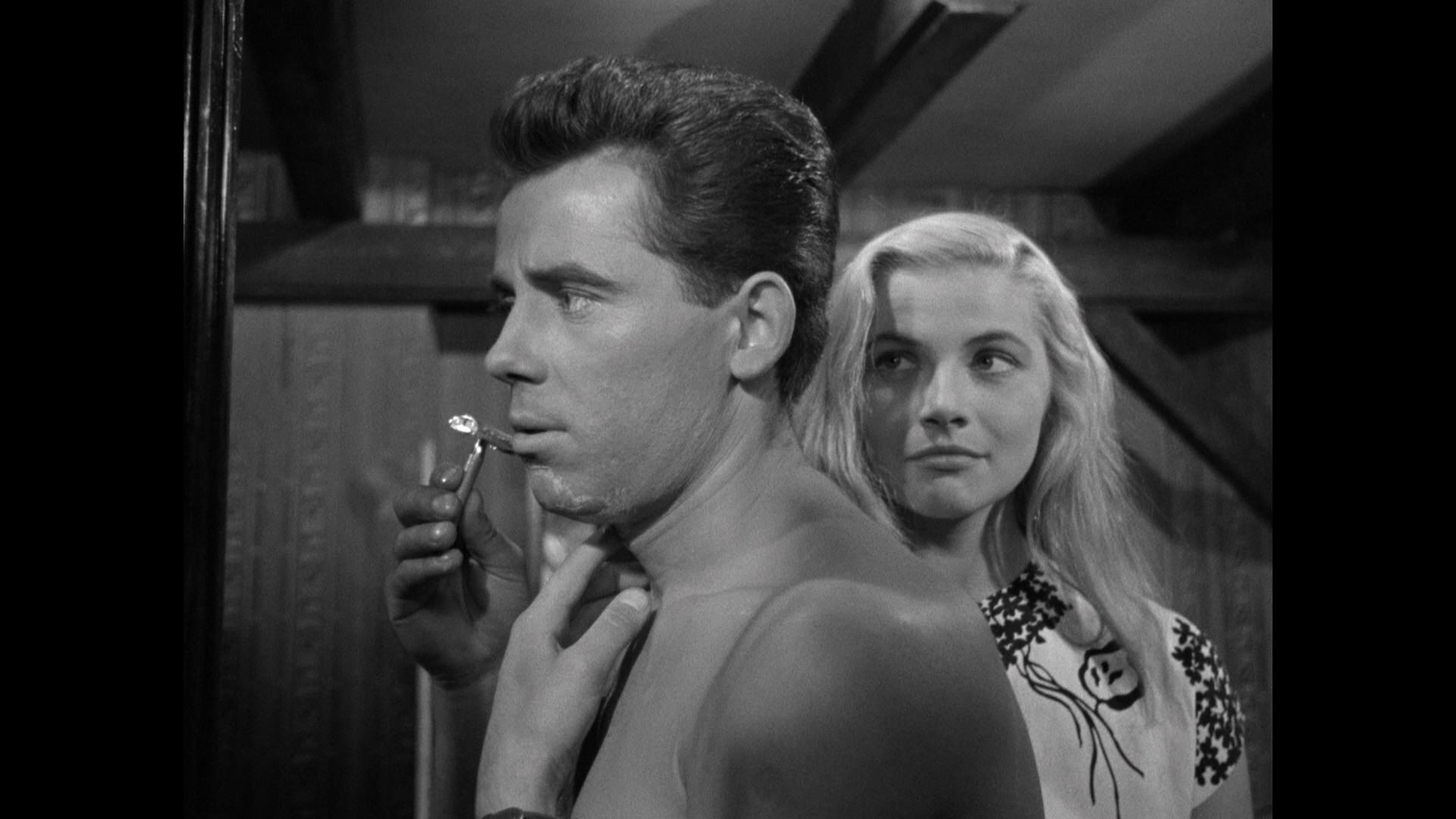 give it a startling immediacy.
give it a startling immediacy.
That brings us to the third and most legendary of the three films, 1958's Ashes and Diamonds (Popiół i diament), a watershed moment in Polish cinema and a dividing of sorts that cleared the way for the new wave of filmmaking to come. In his star-making role, Zbigniew Cybulski (The Saragossa Manuscript), who had debuted in a small role at the beginning of A Generation and died tragically in 1967, stars as Maciek, a onetime Home Army soldier in the waning days of World War II. Along with two colleagues, Andrzej (Pawlikowski) and Drewnowski (Kobiela), he's ordered to assassinate Konrad Szczuka, an incoming communist official. After the first attempt goes disastrously wrong, they're ordered to try again -- but Maciek finds his duty tested when he meets and falls for barmaid Krystyna (Krzyżewska), fully aware that he'll have to flee once the assignment is done. The film adapts a more complex and sprawling novel by Jerzy Andrzejewski, which was extremely familiar reading in schools and had stymied previous adaptation attempts; 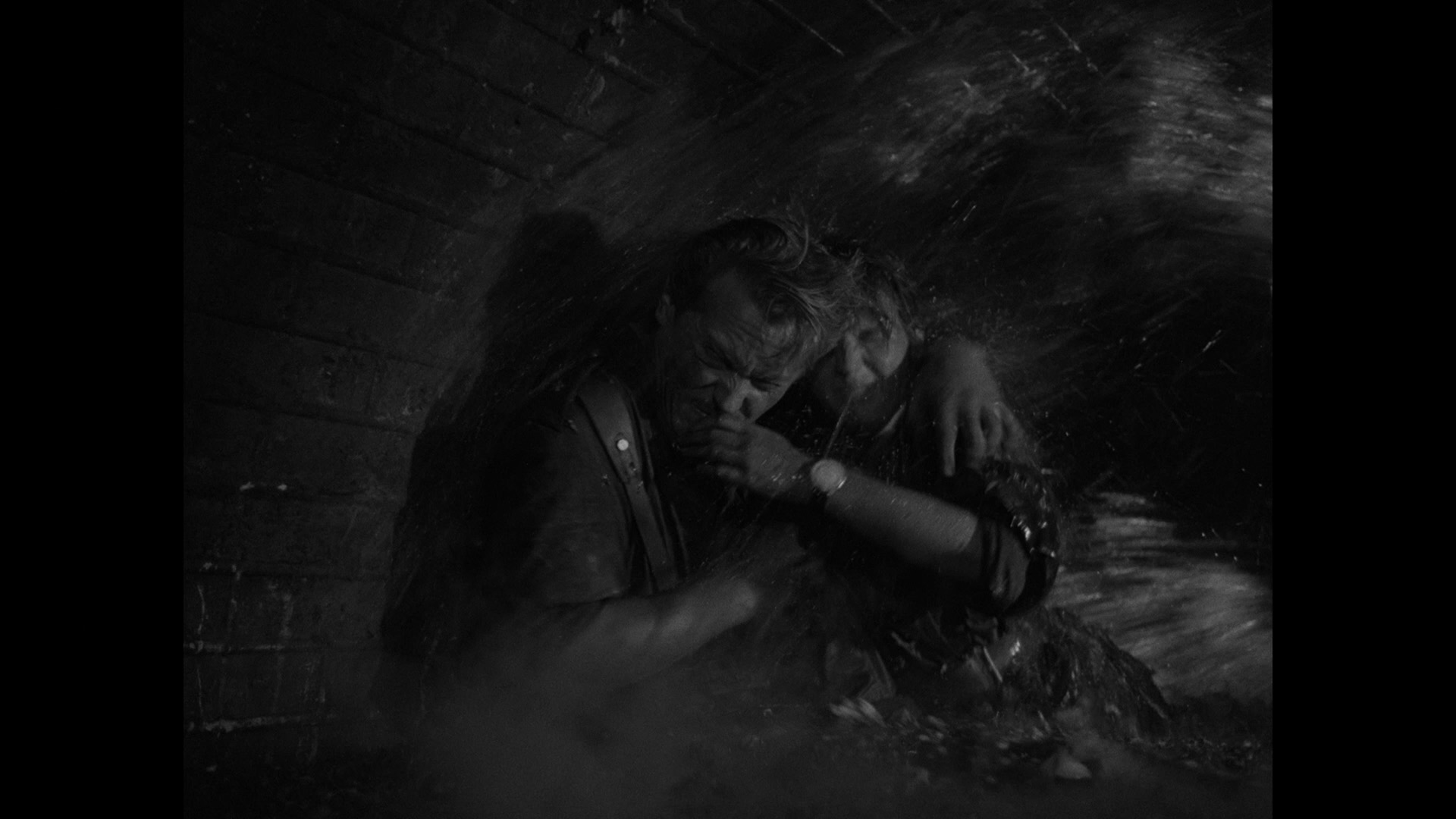 here the decision to hone in on Maciek and compress the action down to a 24-hour period proved to be a wise one as the film as a narrative velocity that makes it a natural successor to Kanal. What really sets it apart though is the performance by Cybulski, cutting an unforgettable figure with his sunglasses and cool demeanor (which led to obvious and unavoidable James Dean comparisons, though you can see a bit of proto-Steve McQueen as
here the decision to hone in on Maciek and compress the action down to a 24-hour period proved to be a wise one as the film as a narrative velocity that makes it a natural successor to Kanal. What really sets it apart though is the performance by Cybulski, cutting an unforgettable figure with his sunglasses and cool demeanor (which led to obvious and unavoidable James Dean comparisons, though you can see a bit of proto-Steve McQueen as 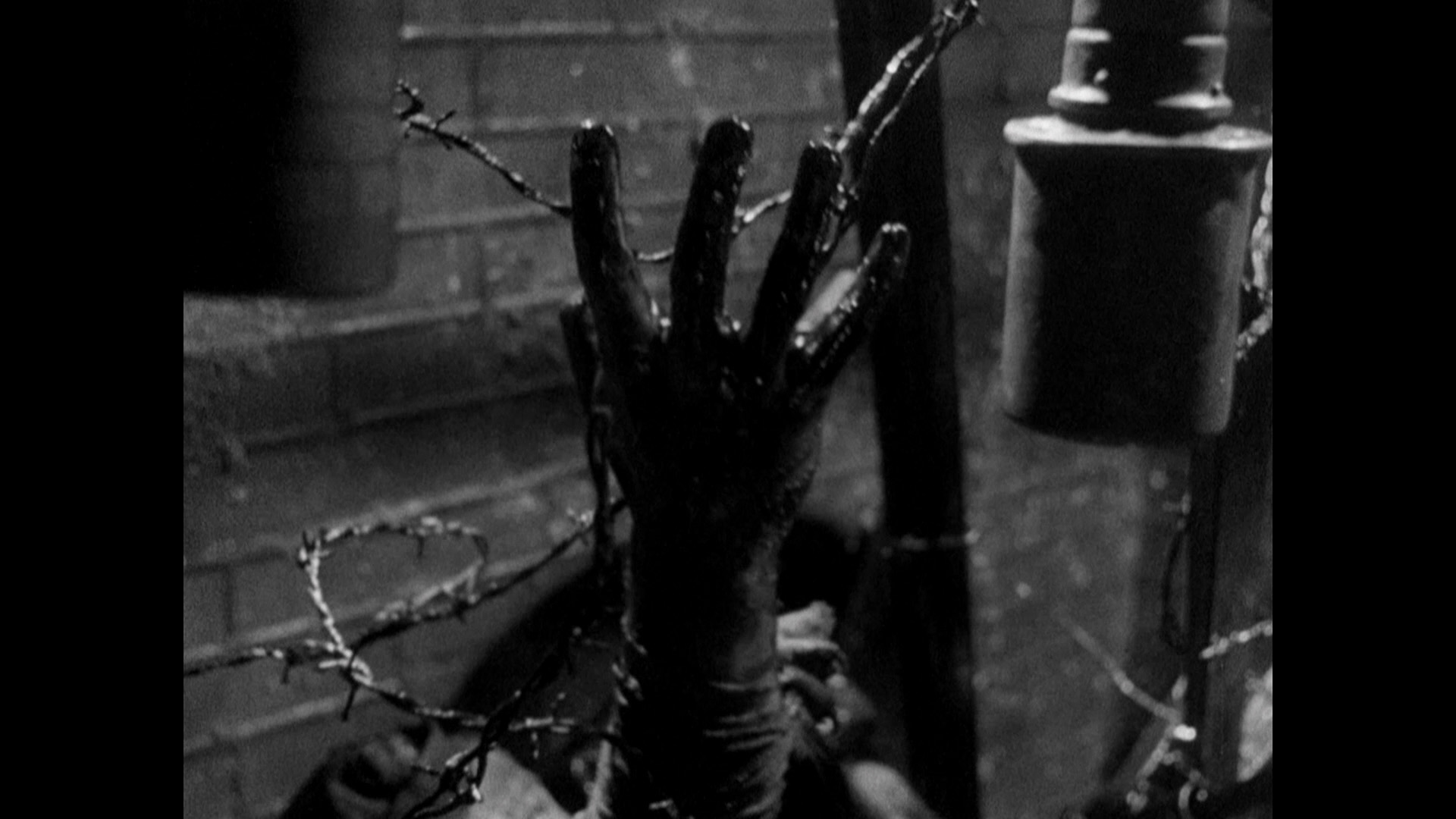 well).
well).
All three films have undergone multiple restorations over the years, with all three included in a now-discontinued 2005 DVD set from The Criterion Collection. All three looked very good at the time, with extras including a commentary by Polish film scholar Annette Insdorf for Ashes and Diamonds, a making-of newsreel for the same film, and Wajda's student short Ceramics from Iłża (Ceramika Iłżecka, 1951, 9m53s), about the nurturing of younger generations to continue the artistic tradition of pottery crafts. Other extras include interviews with Wajda and colleagues second director Janusz Morgenstern, and film critic Jerzy Plazewski, an interview with Warsaw Uprising member Jan Nowak-Jezioranski, behind-the-scenes and promotional galleries, a gallery of Wajda drawings and paintings, and essays in the insert booklet by Ewa Mazierska, John Simon, and Paul Coates. A U.K. DVD set from Arrow Academy was issued in 2008 featuring a 25-minute Wajda interview, but the presentations were inconsistent with Ashes looking much weaker than its U.S. 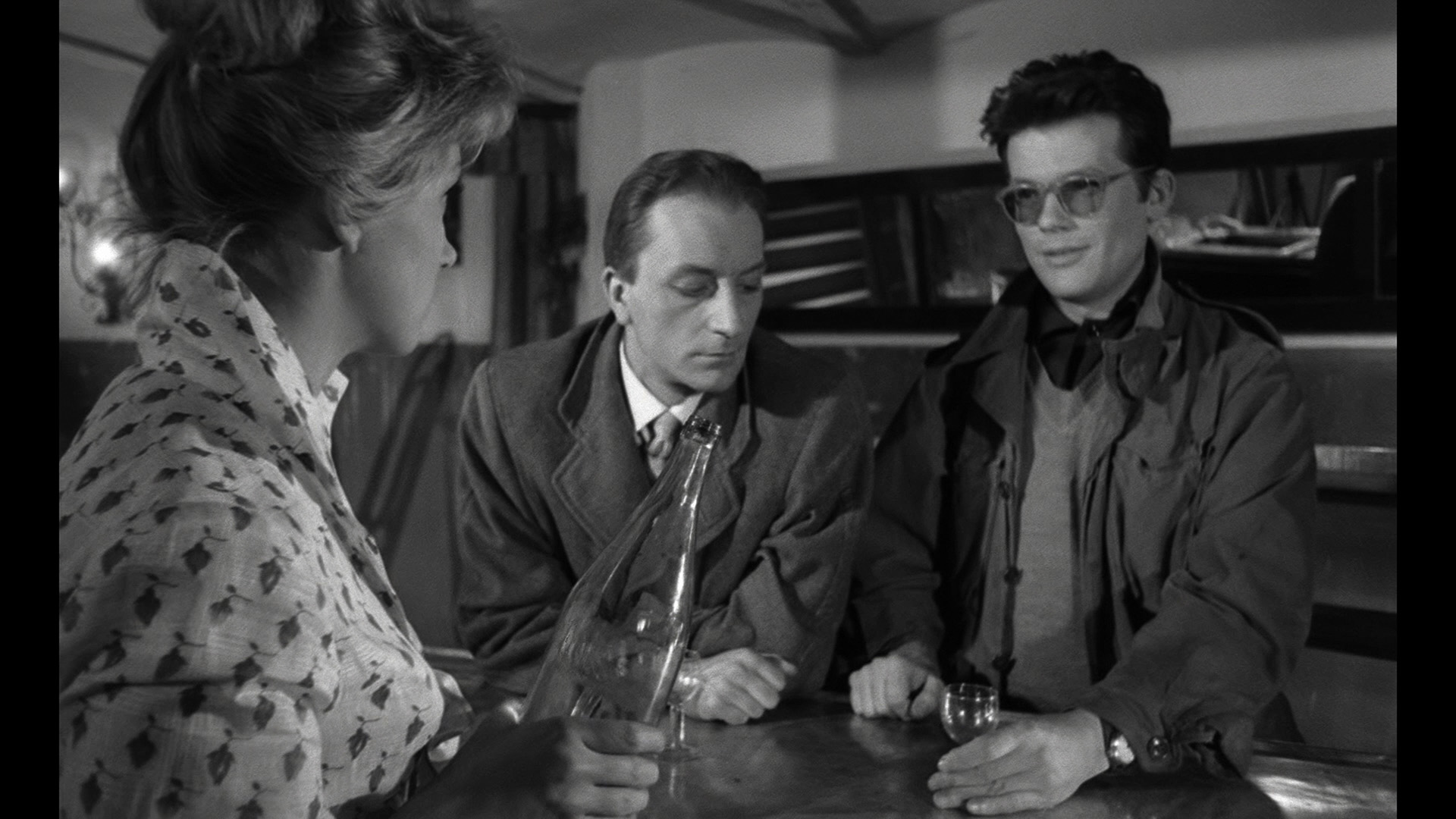 counterpart due to excessive filtering, dodgy compression, or a funky mixture of both. Preceding all of these were briefly available U.S. DVDs from Facets of Ashes and Kanal in 2003 that were taken from iffy conversions of the Polish DVD releases from Polish Art Center, but at least the
counterpart due to excessive filtering, dodgy compression, or a funky mixture of both. Preceding all of these were briefly available U.S. DVDs from Facets of Ashes and Kanal in 2003 that were taken from iffy conversions of the Polish DVD releases from Polish Art Center, but at least the 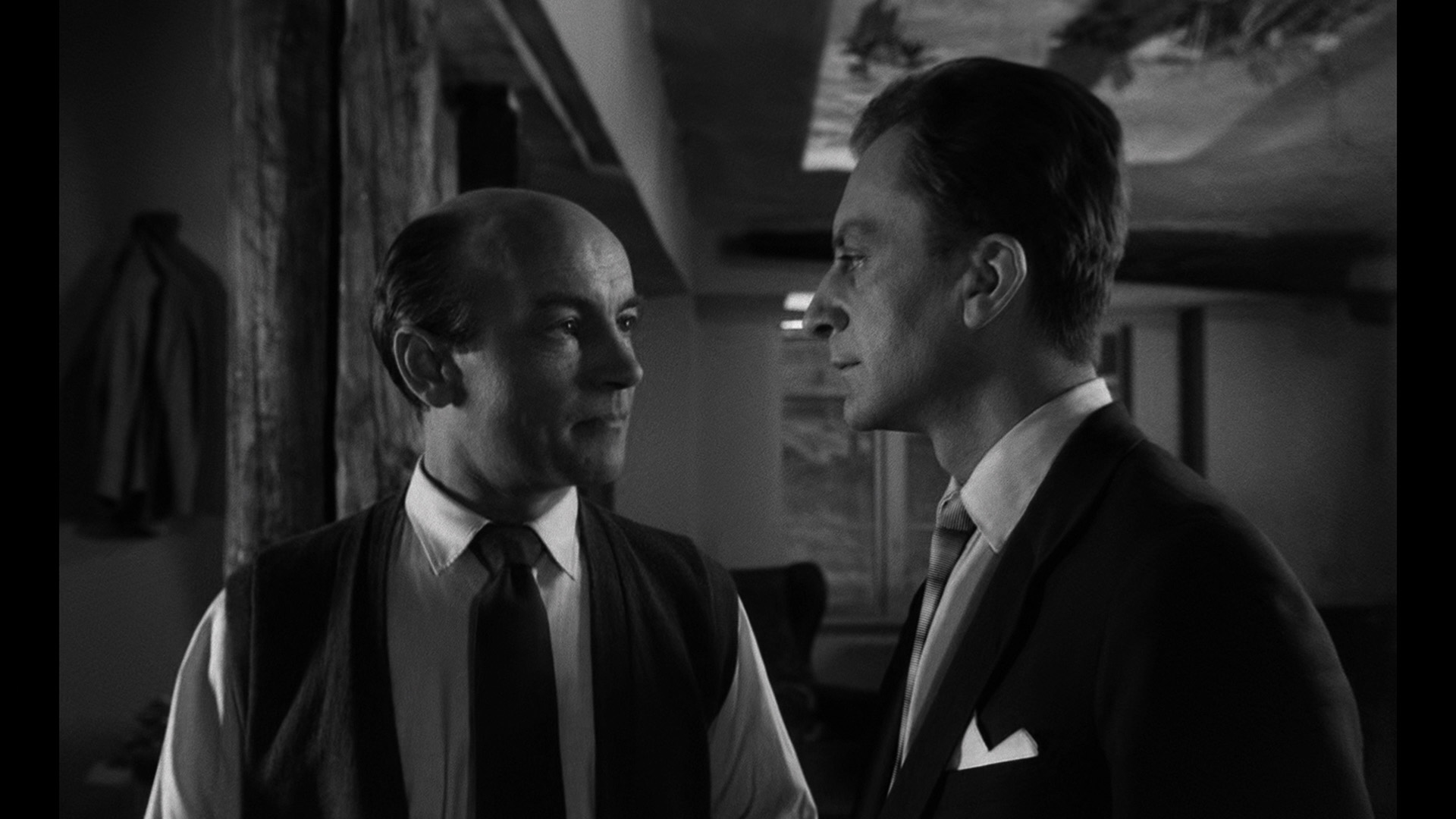 subtitles were optional. For some reason Criterion opted to only release Ashes and Diamonds later on Blu-ray as a standalone edition, porting over the Insdorf commentary, the Wajda interview piece, the insert essay, and newsreel footage, while adding a new Insdorf video appreciation. The transfer is cited as a new 4K restoration and looks excellent.
subtitles were optional. For some reason Criterion opted to only release Ashes and Diamonds later on Blu-ray as a standalone edition, porting over the Insdorf commentary, the Wajda interview piece, the insert essay, and newsreel footage, while adding a new Insdorf video appreciation. The transfer is cited as a new 4K restoration and looks excellent.
That brings us to the Second Run box, which is touted as featuring new 2K restorations by Wytwórnia Filmów Dokumentalnych i Fabularnych (WFDiF), Poland. Given that there isn't a ton of HD competition out there, it's good to see that Ashes easily stacks up well to the U.S. release and the other two films are in superb quality here as well. The big revelation here is actually Kanal, with its impressive underground sequences now more legible and aesthetically powerful than ever before. The LPCM 2.0 mono Polish tracks for all the films are in excellent shape as well with no issues, and the optional English subtitles are excellent as well. Wajda's 2005 interviews are included here for A Generation (7m49s), Kanal (10m19s), and Ashes and Diamonds (24m32s), and they're really best watched in succession after you've seen all three films as his thoughts thread from one to the next smoothly with clear memories of their making, his own wartime experiences, and the adaptation processes for two of them. Also included are new, exclusive video intros to each film by critic, curator and scholar Michał Oleszczyk. (15m49s, 14m20s, and 15m28s), covering the topics of the Warsaw Uprising, the cultural shift in 1956 that 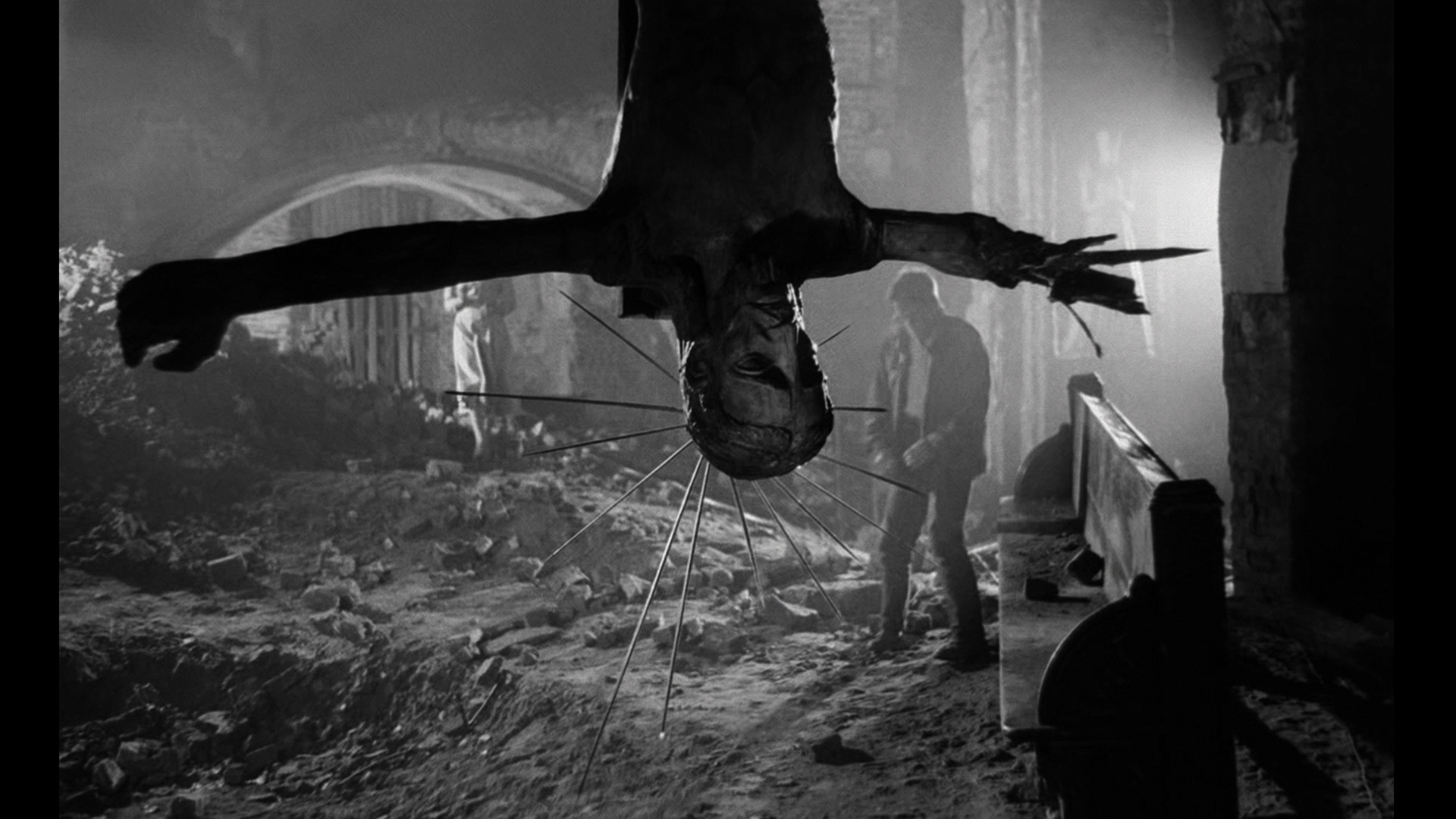 affected the latter two films, a
affected the latter two films, a 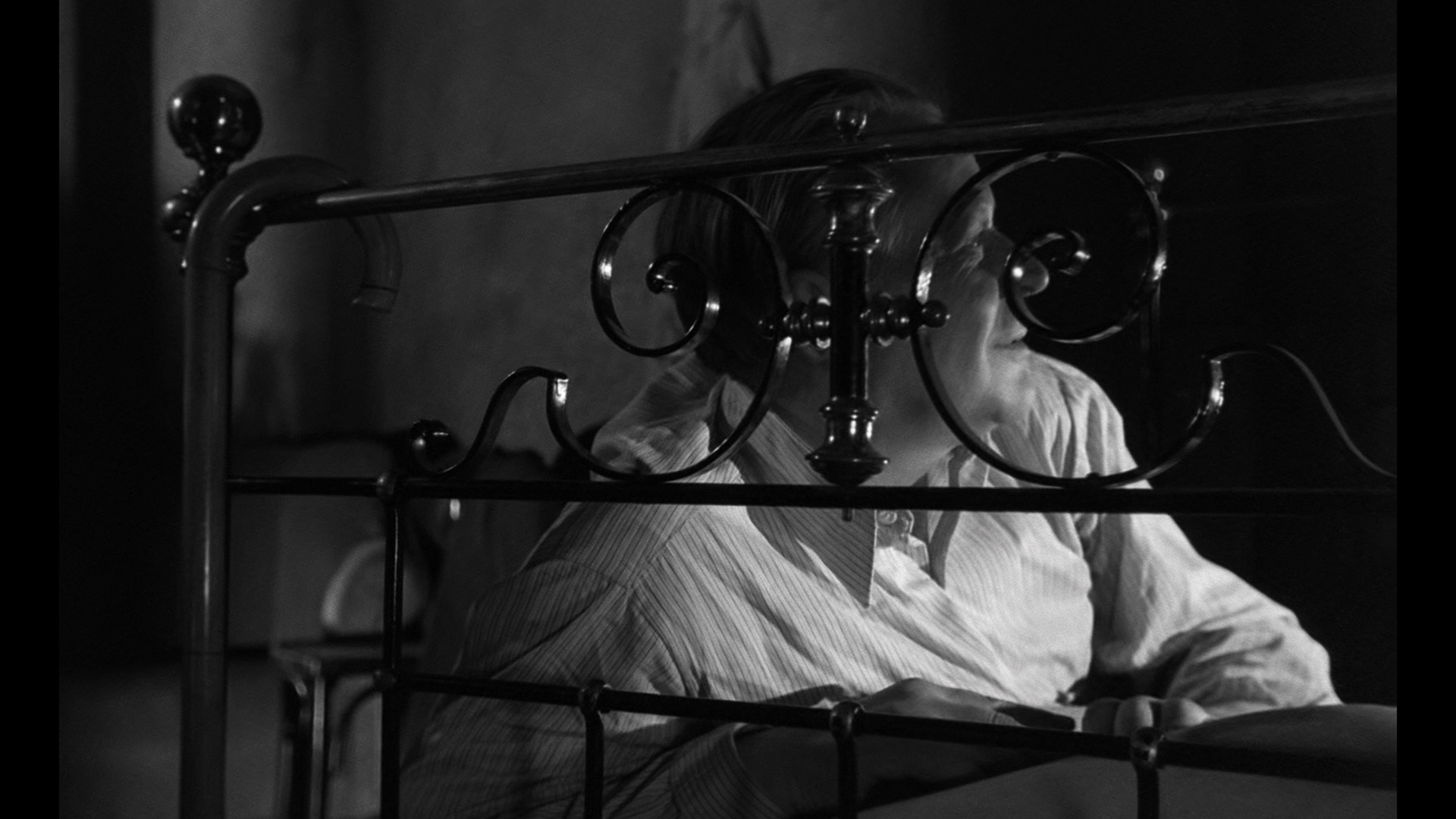 key passage from Quentin Tarantino's novelization of Once Upon a Time in Hollywood, similarities to other watershed films like The Wages of Fear, an expected shout out to The Apple, and the "mangled glory" of Polish history depicting in Ashes. Wajda’s earliest short work is represented here with newly remastered presentations of the childhood snapshot The Bad Boy (Zły chłopiec, 1951, 6m37s), Ceramics from Iłża in better shape than the Criterion release, and While You’re Sleeping (Kiedy ty śpisz, 1953, 10m37s), a lyrical take on those educational and TV shorts about late night jobs like railyard workers, police, and bakers. However, the biggest reason extras-wise to upgrade here (or dive in for the first time) is the audio commentaries provided for each film by producer and film historian Michael Brooke, who delivers what amounts to an engaging crash course in postwar Polish cinema and Wajda's ascendance as a director. The organization and delivery here are marvelous as he walks you through in a friendly but informative fashion, pointing out significant visual tropes, filling in the backgrounds of many players, and providing context of Poland during World War II and at the times these films were released (with the industry essentially having to start from scratch including actors who had been doing work elsewhere given the dearth of cinema opportunities). Essential listening. The set also comes with separate insert booklets for each film with deep dive essays by Ewa Mazierska, Tony Rayns and Peter Hames.
key passage from Quentin Tarantino's novelization of Once Upon a Time in Hollywood, similarities to other watershed films like The Wages of Fear, an expected shout out to The Apple, and the "mangled glory" of Polish history depicting in Ashes. Wajda’s earliest short work is represented here with newly remastered presentations of the childhood snapshot The Bad Boy (Zły chłopiec, 1951, 6m37s), Ceramics from Iłża in better shape than the Criterion release, and While You’re Sleeping (Kiedy ty śpisz, 1953, 10m37s), a lyrical take on those educational and TV shorts about late night jobs like railyard workers, police, and bakers. However, the biggest reason extras-wise to upgrade here (or dive in for the first time) is the audio commentaries provided for each film by producer and film historian Michael Brooke, who delivers what amounts to an engaging crash course in postwar Polish cinema and Wajda's ascendance as a director. The organization and delivery here are marvelous as he walks you through in a friendly but informative fashion, pointing out significant visual tropes, filling in the backgrounds of many players, and providing context of Poland during World War II and at the times these films were released (with the industry essentially having to start from scratch including actors who had been doing work elsewhere given the dearth of cinema opportunities). Essential listening. The set also comes with separate insert booklets for each film with deep dive essays by Ewa Mazierska, Tony Rayns and Peter Hames.
Reviewed on February 17, 2024





 in the history of Polish cinema than any other filmmaker, Andrzej Wajda came storming out of the gate
in the history of Polish cinema than any other filmmaker, Andrzej Wajda came storming out of the gate  just under a decade after the end of World War II with a trilogy of films revolving around different aspects of the conflict. With each of the three films generating more acclaim than the last, they cemented a career that would be followed by such significant world cinema entries as Man of Iron, the Oscar-winning The Promised Land, Man of Marble, and Danton. The initial trilogy has been a home video mainstay for years, with the most heralded title getting multiple Blu-ray releases, but the U.K. Blu-ray set from late 2023 from Second Run offers the richest rewards with all three titles in immaculate restorations with a welcome batch of substantial extras.
just under a decade after the end of World War II with a trilogy of films revolving around different aspects of the conflict. With each of the three films generating more acclaim than the last, they cemented a career that would be followed by such significant world cinema entries as Man of Iron, the Oscar-winning The Promised Land, Man of Marble, and Danton. The initial trilogy has been a home video mainstay for years, with the most heralded title getting multiple Blu-ray releases, but the U.K. Blu-ray set from late 2023 from Second Run offers the richest rewards with all three titles in immaculate restorations with a welcome batch of substantial extras.  resistance through his new day job at a furniture store, and In the process he also finds a potential romance with Dorota (Modrzynska). With its naturalistic depictions of war-torn Polish ghettos and frequent discussions of Marxism and the nature of revolt, the film was enough to serve
resistance through his new day job at a furniture store, and In the process he also finds a potential romance with Dorota (Modrzynska). With its naturalistic depictions of war-torn Polish ghettos and frequent discussions of Marxism and the nature of revolt, the film was enough to serve  as a calling card for everyone involved. Despite Wajda's own subsequent minor misgivings about the film, it's a striking introduction with an often gripping sense of realism as the actors do their own stunt work, even hurtling on and off trains and firing loaded machine guns.
as a calling card for everyone involved. Despite Wajda's own subsequent minor misgivings about the film, it's a striking introduction with an often gripping sense of realism as the actors do their own stunt work, even hurtling on and off trains and firing loaded machine guns. this is basically a survival story pared down to its brutal essentials with screenwriter Jerzy Stefan Stawiński using his own experience during the Warsaw Uprising in the sewers to
this is basically a survival story pared down to its brutal essentials with screenwriter Jerzy Stefan Stawiński using his own experience during the Warsaw Uprising in the sewers to  give it a startling immediacy.
give it a startling immediacy.  here the decision to hone in on Maciek and compress the action down to a 24-hour period proved to be a wise one as the film as a narrative velocity that makes it a natural successor to Kanal. What really sets it apart though is the performance by Cybulski, cutting an unforgettable figure with his sunglasses and cool demeanor (which led to obvious and unavoidable James Dean comparisons, though you can see a bit of proto-Steve McQueen as
here the decision to hone in on Maciek and compress the action down to a 24-hour period proved to be a wise one as the film as a narrative velocity that makes it a natural successor to Kanal. What really sets it apart though is the performance by Cybulski, cutting an unforgettable figure with his sunglasses and cool demeanor (which led to obvious and unavoidable James Dean comparisons, though you can see a bit of proto-Steve McQueen as  well).
well).  counterpart due to excessive filtering, dodgy compression, or a funky mixture of both. Preceding all of these were briefly available U.S. DVDs from Facets of Ashes and Kanal in 2003 that were taken from iffy conversions of the Polish DVD releases from Polish Art Center, but at least the
counterpart due to excessive filtering, dodgy compression, or a funky mixture of both. Preceding all of these were briefly available U.S. DVDs from Facets of Ashes and Kanal in 2003 that were taken from iffy conversions of the Polish DVD releases from Polish Art Center, but at least the  subtitles were optional. For some reason Criterion opted to only release Ashes and Diamonds later on Blu-ray as a standalone edition, porting over the Insdorf commentary, the Wajda interview piece, the insert essay, and newsreel footage, while adding a new Insdorf video appreciation. The transfer is cited as a new 4K restoration and looks excellent.
subtitles were optional. For some reason Criterion opted to only release Ashes and Diamonds later on Blu-ray as a standalone edition, porting over the Insdorf commentary, the Wajda interview piece, the insert essay, and newsreel footage, while adding a new Insdorf video appreciation. The transfer is cited as a new 4K restoration and looks excellent. affected the latter two films, a
affected the latter two films, a  key passage from Quentin Tarantino's novelization of Once Upon a Time in Hollywood, similarities to other watershed films like The Wages of Fear, an expected shout out to The Apple, and the "mangled glory" of Polish history depicting in Ashes. Wajda’s earliest short work is represented here with newly remastered presentations of the childhood snapshot The Bad Boy (Zły chłopiec, 1951, 6m37s), Ceramics from Iłża in better shape than the Criterion release, and While You’re Sleeping (Kiedy ty śpisz, 1953, 10m37s), a lyrical take on those educational and TV shorts about late night jobs like railyard workers, police, and bakers. However, the biggest reason extras-wise to upgrade here (or dive in for the first time) is the audio commentaries provided for each film by producer and film historian Michael Brooke, who delivers what amounts to an engaging crash course in postwar Polish cinema and Wajda's ascendance as a director. The organization and delivery here are marvelous as he walks you through in a friendly but informative fashion, pointing out significant visual tropes, filling in the backgrounds of many players, and providing context of Poland during World War II and at the times these films were released (with the industry essentially having to start from scratch including actors who had been doing work elsewhere given the dearth of cinema opportunities). Essential listening. The set also comes with separate insert booklets for each film with deep dive essays by Ewa Mazierska, Tony Rayns and Peter Hames.
key passage from Quentin Tarantino's novelization of Once Upon a Time in Hollywood, similarities to other watershed films like The Wages of Fear, an expected shout out to The Apple, and the "mangled glory" of Polish history depicting in Ashes. Wajda’s earliest short work is represented here with newly remastered presentations of the childhood snapshot The Bad Boy (Zły chłopiec, 1951, 6m37s), Ceramics from Iłża in better shape than the Criterion release, and While You’re Sleeping (Kiedy ty śpisz, 1953, 10m37s), a lyrical take on those educational and TV shorts about late night jobs like railyard workers, police, and bakers. However, the biggest reason extras-wise to upgrade here (or dive in for the first time) is the audio commentaries provided for each film by producer and film historian Michael Brooke, who delivers what amounts to an engaging crash course in postwar Polish cinema and Wajda's ascendance as a director. The organization and delivery here are marvelous as he walks you through in a friendly but informative fashion, pointing out significant visual tropes, filling in the backgrounds of many players, and providing context of Poland during World War II and at the times these films were released (with the industry essentially having to start from scratch including actors who had been doing work elsewhere given the dearth of cinema opportunities). Essential listening. The set also comes with separate insert booklets for each film with deep dive essays by Ewa Mazierska, Tony Rayns and Peter Hames.![]()